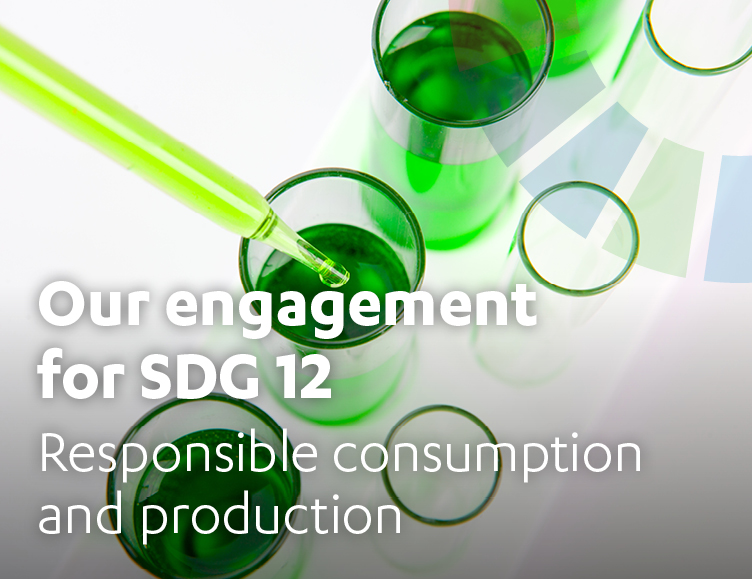Our commitment to SDG 12: responsible consumption and production
At Janssen, we are committed to the 17 Sustainable Development Goals (SDGs) of the United Nations. SDG 12 focuses on responsible consumption and production. We are organizing our production processes as efficiently and sustainably as possible. One way of doing so, is by means of the list of recommended solvents. Colleagues Walter Filliers (Scientific Integrator; †2020)* and Brecht Egle (Process Safety scientist) enthusiastically explained how.
How do we use solvents?
A solvent is the liquid in which molecules are dissolved so that they can interact with each other. At Janssen, the use of solvents is inevitable for all chemical reactions that are required to produce the active ingredients of medicines and vaccines. “After this production process, the solvents, not incorporated into the final product, are left contaminated, so to speak. Because of the high volumes needed in the pharmaceutical industry, solvents make up the largest share of the waste produced by the industry", Brecht explains. To promote circular economy, and thereby make the production process more sustainable, solvents are purified after which they can be reused. Unfortunately, this is not always possible.
Green solvents as a sustainable alternative
An option that is even more sustainable is the use of green solvents. The definition of a 'green' solvent is not so straightforward. In principle, a solvent is classified as 'green' when it is not harmful to people and the environment. This means that it cannot be harmful to our health, but also not to the soil or water quality. The safety of solvents is also important. For example, green solvents cannot not be flammable or explosive. Walter explains, "Water is a good example of a solvent that meets all these criteria. The criteria for green solvents were our inspiration in creating the list of recommended solvents."
The initiative the list of recommended solvents originated as a result of the REACH legislation, a European regulation on the production and trade of chemical substances." REACH stands for: Registration, Evaluation, Authorization and Restriction of Chemicals, and the legislation can ban the use of certain chemicals. "This could become a problem for the pharmaceutical industry and society, because without certain solvents, medicines can no longer be produced", Walter says. In response to the introduction of the REACH legislation, a list of recommended solvents was created, that can be used best during our production processes. Brecht adds: "We now try to replace as many solvents as possible by recommended solvents, unless there is really no alternative available."
"To make the production process future-proof, we must timely replace solvents by recommended solvents. By using recommended solvents, we reduce the impact of our production on environment and climate, and thereby we minimize our ecological footprint!"
Other sustainability initiatives
This is just one example of Janssen's commitment to a sustainable world. Want to know how we are committed to the other Sustainable Development Goals? Find out here!
* Walter Filliers passed away in December 2020. He was a highly valued colleague at Janssen from 1983 through 2020.
EM-70082 - 02-aug-2021

